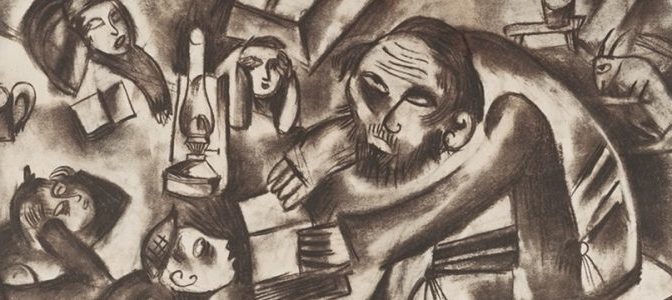
A lecture by Carmen Reichert (Augsburg University) in the frame of the seminar on Modern Jewish History of the Institute of Contemporary History (AV ČR) and CEFRES in partnership with the Masaryk Institute (AV ČR).
Where: CEFRES library, Na Florenci 3, 110 00 Prague 1
When: from 5:30 pm to 7:00 pm
Language: English
Abstract
Narrations on the Choice of Yiddish in Autobiographical Writings after Peretz
It should come as no surprise that literary autobiographies essentially tell us how writers became writers. From Rousseau’s Confessions to Goethe’s Bildungsroman – lire and écrire – an author’s reading lists and their first attempts at writing are crucial topoi to the genre. But the Yiddish writers of the early twentieth century did not grow up with the knowledge that their mother tongue was a literary language. Hebrew and not Yiddish was the language of learning in private schools for Jewish boys. This is why Yiddish writing in the early twentieth-century developed somewhere between the traditional, Hebrew-dominated education system of Cheders and Yeshivas and non-Jewish libraries. According to tradition, written Yiddish texts were primarily intended for women and uneducated men. Therefore, male and female writers developed different writing strategies when writing Yiddish: Whereas women could trace their writings back to early Yiddish autobiographies such as Glikl of Hameln’s “Zikhroynes” (Memories), men preferred to follow Western European traditions. Yiddish autobiographies often link the personal lives of their writers to the history of Yiddish. For example, when Sholem Aleichem compares his life to the market (“yarid”), he simultaneously commits his voice to the “market language” of Yiddish. I. L. Peretz, the “father” of the Yiddish literature, was particularly influential in this context. Not only did he encourage writers to switch to their native language, his autobiography “Mayne zikhroynes” (My Memoirs), which draws inspiration from Romanticism, inspired a great number of autobiographical texts from younger writers.
Carmen Reichert is a postdoctoral researcher at the Augsburg University currently working on a project about literature and language debates in context of the Czernowitz language conference. For more, please see here.
Gellner Seminar
Professor Tom Lodge (University of Limerick) will give a lecture within the Gellner seminar organized by the Czech Association for Social Anthropology, the Czech Society of Sociology, in cooperation with the Institute of Ethnology of the Czech Academy of Sciences and CEFRES.
When: 14 May 2019, 4:30 pm
Where: Conference room of the Institute of Czech Literature, Na Florenci 3, Prague 1 – Ground floor, next to the CEFRES Library. Language: English
Abstract
Documented Encounters between South African and Czech communists were sporadic and accidental in the early history of both Communist parties. Many years later the pioneering South African trade unionist, Ray Alexander, recalled meeting Klement Gottwald at a clandestine training school in her native Latvia shortly before her migration to Cape Town in 1930. The Czech crisis of 1939 prompted the resignation of a senior personality in the South African party. Young South African Communists visited Prague just after the Second World War and were later active in the Communist-affiliated international student movement based in the Czech capital. The Czech government maintained a diplomatic presence in South Africa until 1962, the last communist administration to so and Czech officials were urged by South African communists to support trade sanctions. By the 1960s contact between the “fraternal” parties was more institutionalized. At this stage, the Czech army was beginning to supply training to Communist recruits in the insurgent force led by Nelson Mandela, Umkhonto we Sizwe. The South Africa Communist Party, in exile from 1965, held a key party meeting hosted by Czech communists in Prague that year. For the next two decades the South African Party would be locally represented in Prague on the editorial board of the World Marxist Review. The South African Communists were divided internally by the events of the Prague Spring though in public they professed their support for “normalization”. The lecture will explore the background to these contacts and encounters. The Czech “people’s democracy” of the 1950s was a key source of inspiration for the development of the South African notion of a “national democratic” revolution. Czech support for this programme in the 1960s and 1970s was both a source of confidence and fragility, though. The lecture will consider South African-Czech connections and linkages against the backdrop of the broader strategic concerns that informed and shaped Soviet and East European support for the South African liberatory politics.
Tom Lodge is a professor of Peace and Conflict Studies at the University of Limerick.
With a mother and father born respectively in Calcutta and Brno, Tom Lodge was educated in Nigeria, Borneo and Britain. He has a D. Phil from York in Southern African Studies and he is a member of the Royal Irish Academy. After working as a research assistant at the University of York’s Centre for Southern African Studies he began teaching in the Politics Department at the University of the Witwatersrand in Johannesburg in 1978. He remained at Wits University until 2005, leading its politics department through the 1990’s. In 2005 he moved to the University of Limerick as Professor of Peace and Conflict Studies. He visits South Africa two or three times a year and is a board member of the Electoral Institute, a Johannesburg-based NGO. He has published extensively on South African political history. His books include Nelson Mandela: A Critical Life (Oxford University Press, 2005) and Sharpeville: An Apartheid Massacre and its Consequences (Oxford University Press, 2017). He has almost completed a book about the history of the South African Communist Party from its origins in the syndicalist politics of the white labour movement in South Africa in the 1900’s to its present-day development as a mass party. He is about to begin a book commissioned by Routledge entitled “Political Corruption in Africa”.

